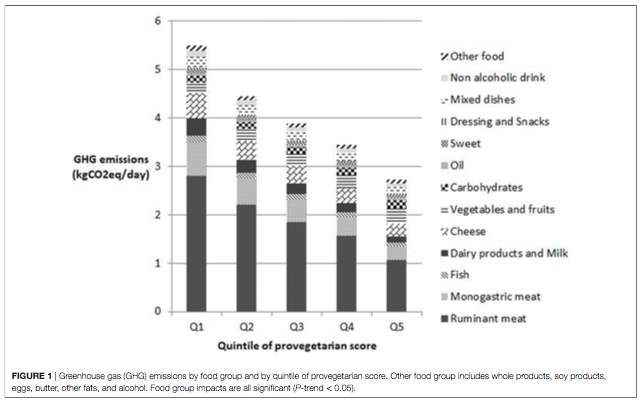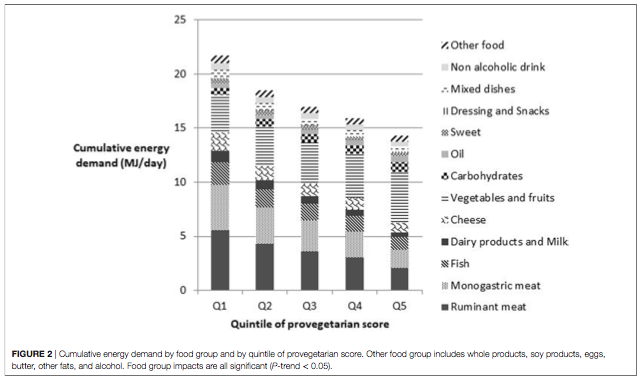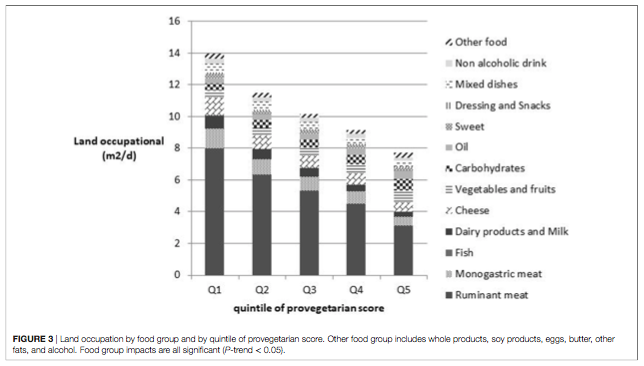Where we get our foods from and what we choose to eat is making a much larger environmental impact that most of us are probably aware of.

With the global population growth not slowing down anytime soon, the environmental cost of the foods and animals that the billions of us choose to eat should be carefully considered. Therefore, identifying and promoting diets that are the most environmentally sustainable is extremely important.

Not only are there substantial environmental costs - things like land and biodiversity degradation, huge amounts of water use, air pollution - but there are also massive financial operating costs needed for the relentless amounts of electricity, feed, fertiliser used during production.

A recent study analysed data from over 34,000 French participants in order to determine the level of environmental impact from their chosen diets.
People in the study were split into 5 groups (quintiles; Q1 - Q5) based on how much of their diet consisted of plant-based foods. Those that ate the most animal-products (and therefore, the least amount of plant foods) were grouped into Q1 - and those consuming the most plants (closer to a vegetarian or vegan diet) were in Q5.

Results from the study revealed that there is a linear relationship between all measures of environmental impact (amount of daily greenhouse gas emissions and amount of energy and land required for production) and consumption of animal products (i.e. plant-based diets are more environmentally friendly.
Greenhouse gas emissions

(Mean data in graph above is taken from study)
The greenhouse gas emissions from heavy meat-eaters (Q1) was more than double that of the mostly plant-eaters (Q5) - with the major contributor across all groups being ruminant meat (cattle, sheep, goats, buffalo and game).
Cumulative energy demand

(Mean data in graph above is taken from study)
The amount of energy needed to produce certain food types is also important to consider when assessing environmental impact. This study found that plant-rich diets also reduced the cumulative energy demand as ruminant and monogastric meats required the most daily energy input.
Cumulative energy demand (CED) was measured as megajoules (MJ)/day. Megajoule = 1 000 000 Joules (1000 kJ)
Land occupation

(Mean data in graph above is taken from study)
Likewise, diets containing the most animal-based products require the most amount of land - as livestock needs dramatically more land for production.
Read the full article here
Lacour, C, Seconda, L, Allès, B, Hercberg, S, Langevin, B, Pointereau, P, Lairon, D, Baudry, J & Kesse-Guyot, E (2018), 'Environmental Impacts of Plant-Based Diets: How Does Organic Food Consumption Contribute to Environmental Sustainability', Frontiers In Nutrition, vol.8, no.8
Images are my own, sourced from Pixabay or linked
My Latest Posts
Savour the flavour: Why Japanese diets and the taste of umami are so good for your health 🍚 I lost 35% of my crypto investments in the FIRST MONTH!! 😱 Student stress and weight gain Can Diets Tailored To Our Genetics Help With Weight Loss? #JustOne Orange Provides You With… Printable Diets: How Soon Will We Have 3D Foods?
My Latest Recipes
Smoky Miso Tempeh Marinade | Vegan 10 Tasty Vegan Meals | Instagram Deep Dive Toasted Avocado and Enoki Mushroom Sandwich | My Favourite Vegan Lunch
CONNECT WITH ME ON
Steemit · Instagram · Facebook · Twitter · Snapchat · Discord

UPVOTE | FOLLOW | RESTEEM


